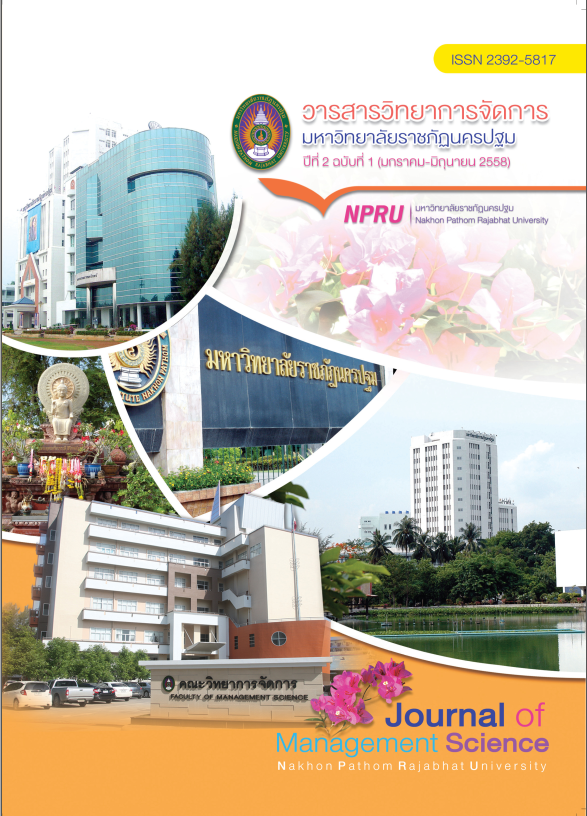The Revenue Code and Sub-ordinance Amendment for Personal Income Tax Voluntary Compliance in Thailand
Main Article Content
Abstract
This research delineates guidelines in improving the tax law standards and procedures in collecting personal income tax of accordance with the Revenue Code in order to increase the level of compliance by paying personal income tax levied. The principal factors in this study consist of the Revenue Code, sub-ordinance being put in force for taxation. This investigation divided into 2 parts. The first part, qualitative research was conducted by means of in-depth interviews with those 30 personal income taxpayers who have consistent taxpaying records every fiscal year The second part, quantitative research was conducted by means of using questionnaires with 730 personal income taxpayers. Data analysis collected by means of the percentage of scores, the mean, standard deviation, and regression analysis at the statistical significant level .05.
After concluded consideration of qualitative and quantitative research, it was found that taxpayers required improvement in the main factors of the management of collecting personal income tax levied. These factors are respectively as follows: Law, sub-ordinance being put in force for taxation. Taxpayers required withdrawal in specific tax unit of committee, improvement in tax audit process, tax appraisement, tax punishment: civil & criminal, tax appeals system, and taxpayers’ privileges defense, in order to clarify law
standard and procedures, to make equity for taxpayers, and to provide revenue for the country more efficiency. The findings of this investigation come to the summary that how can the State improve the management strategies in the collection of Personal Income Tax in accordance with the Revenue Code in order to gain more voluntary tax compliance.
Pondering in congruity of changing of external factors of taxation management, those factors are as follows: The social situation, the economic situation, the political and governmental situation, and worldwide technological innovation as well.
Article history : Accepted 29 December 2014
SIMILARITY INDEX = 17.34
Article Details
The views and opinions of the article appearing in this journal are those of the author. It is not considered a view and responsibility of the editorial staff.
References
Allingham, M., & Sandmo, A. (1972). Income Tax Evasion: A Theoretical Analysis J. Public Econ 1,323-338. Retrieved January 15, 2013 from https://bora.nhh.no/bitstream/2330/967/1/dp2004-31.pdf.
Becker, G. S. (1968). Economic theory of criminal behavior. Retrieved May 2, 2013 from https://www.cep.oxfordjournals.org/cgi/reprint/XIII/4/72.pdf.
Brown, R. E., & Mazur, M. J. (2003). The national research program : IRS’ new approach to measuring taxpayer compliance. Retrieved October2, 2013 from www.iadb.org/INT/Trade/1_english/4_ SpecialInfo/ Conference/2002/d_Jun1102-Tax-Compliance/Mazur.pdf.
Easton, D. (1971). The political system : An inquiry into the state of politicalscience. New York : Alfred A. Knopt.
Fiedler, F. E. (1967). Fiedler's contingency theory. Retrieved June 2, 2013 from https://www.leadership-central.com/fiedler's-contingency-theory.html#ixzz21RwQFUbY.
Gagne, R. (1985). The conditions of learning (4th ed.). New York : Holt, Rinehart & Winston.
Musgrave, R. A. (1989). Public finance in theory and practice. New York : McGraw-Hill.
Petty, W. (1899). A treatise of taxes and contributions. London : Cambridge University Press.
Plumley, A. H. (1996). The determinants of individual income tax compliance : Estimating the impacts of tax policy, enforcement, and IRS Responsiveness. Retrieved Jury 12, 2013, from https://www.ssc. sagepub.com/cgi/content/refs/24/4/411.
Sandmo, A. (2004). The theory of tax evasion : A retrospective view. Norwegian School of Economics and Business Discussion Paper 31/04, Administration. Retrieved January 2, 2013 from www.allbusiness.com/personal-finance/individual-taxes/867564-1.html-124k.
Sarason, I. G., & Sarason, B. R. (1985). Social support : Theory. Research and Applications Washington, University of Washington.
Smith, A. (1776). An inquiry into the nature and causes of the wealth of nation. New York : Great Minds Series.
Vroom, V. H. (1964). Work and motivation. New York : John Wiley & Sons.
Webber, C., & Wildavsky, A. (1986). A history of taxation and expenditure in the western world. New York : Simon and Schuster.
Yitzhaki, S. (1974). A note on income tax evasion: A theoretical analysis. Journal of Public Economics 3.
Zeithaml, V. A., & Bitner, J. M. (1996). Service marketing. New York : McGrew-Hill.
Zeithaml, V. A., Parasuraman, A., & Berry, L. L. (1990). Delivery quality service : Balancing customer perceptions and expectations. New York : The Free Press.
Zolo, D. (2007). The rule of law : A critical reappraisal. New York : Springer.


